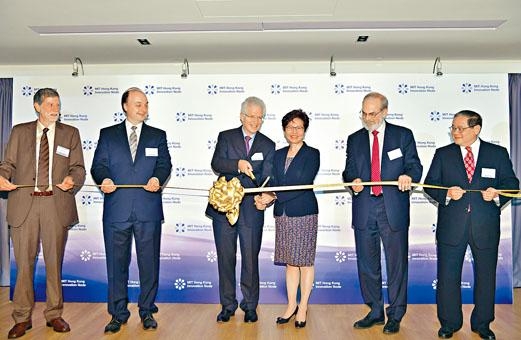
1/1 ■ The Chief Executive Lin Zhengyue attended the opening ceremony of Mit Hong Kong Innovation Node at the Hong Kong Productivity Promotion Bureau Building in 17 years.
The wrestling upgrade of China and the United States, the United States has blocked Huawei and ZTE, and its famous university MIT (MIT) has also announced recently to make more strict reviews of China (including Hong Kong), Russia, and Saudi Arabia -related projects., So worry about Hong Kong's academic and scientific and technological circles.Professor Wei Bingjiang, Vice President of the Hong Kong Polytechnic University (Scientific Research Development), said that he went to MIT to discuss cooperation two weeks ago, and the other party still performed actively.It is not consistent. If there is the pressure of the US government behind it, we are worried that other colleges and universities in the United States will follow.He pointed out that the Hong Kong Government recently spent 10 billion yuan to establish a scientific and technological innovation platform. Many colleges and universities applied to join the platform have cooperated with well -known American universities to worry about platform projects or affected. Vice President of MIT (Research) Maria T. Zuber announced on the college website on April 3 that it will make additional reviews of projects related to China (including Hong Kong), Russia, and Saudi Arabia., Data security and access, economic competitiveness, national security, and politics, citizens and human rights.She added that with changes in the international environment, MIT may modify the list of additional censorship. Many universities in Hong Kong have always contacted and cooperated with MIT. In recent years, MIT has also been very active in Hong Kong. It has carried out multiple projects, including setting up MIT, the world's first innovation center in Jiulongtang in September 2017, "MIT HONG"Kong Innovation Node", who started to cultivate talents from education and academic exchanges between the two places. At that time, Chief Executive Lin Zheng Yue'e also presided over the opening ceremony. In addition, many universities such as HKUST, Richard, CUHK, and Hong Kong University have cooperated projects with MIT. For example, Last year, China University cooperated with MIT to adopt a flip classroom teaching model in some classrooms;Industry research. Vice President of Hong Kong University of Science and Technology (Scientific Research Development) Wei Bingjiang felt suddenly suddenly strengthening MIT's review of the Hong Kong cooperation project. Because he went to the United States to discuss cooperation projects with the college two weeks ago, the other party expressed very welcoming, and there were interoperability arrangements. The news suddenly passed through the news.It is like a "pot of cold water". Worried that if there is a government pressure behind it, other colleges will follow suit.He was also confused about MIT's decision. Because of the early establishment of the United States -Hong Kong Policy Law in 1992, the US government acknowledged that the status of one country and two systems in Hong Kong this time was extremely rare to include Hong Kong and China into the additional examination scope. Professor Wei analyzed that the United States has the strongest strength in the development of scientific research. For example, institutions to strengthen review or even the worst situation to terminate cooperation will have a huge impact on Hong Kong's scientific research and development. Hong Kong universities need to find universities and institutions in other countries and regions.He also gave an example. The Hong Kong Government earned 10 billion yuan to establish two major scientific and technological innovation platforms. Many colleges that applied to join the platform have cooperated with well -known American universities, such as Harvard and other universities, such as Harvard and other universities. Huang Jinhui, deputy dean of the School of Engineering (Foreign Affairs) and director of the Innovation Science and Technology Center, said that the development of scientific research in Hong Kong has been affected by the international political environment. He recalled that he had purchased instruments from the United States before returning and entered data from the United States for big data analysis.However, in 1997, the United States suddenly banned supercomputers, confidential instruments and data samples to Hong Kong. The situation was relaxed after nine months. It is believed that the current 5G and AI chips will also face the approach situation. He pointed out that the current cooperation with MIT has not been affected for the time being. After the confidence of the Sino -US trade friction is eased, MIT may relax the review. Mo Naiguang, a member of the Legislative Council of the Information and Technology Circle, who was invited to visit the United States earlier, said that he did not want Hong Kong to be involved in the contradictions between China and the United States, but he believed that the remarks made by Vice President MIT were reasonable. In recent yearsIn addition and Australia, the Chinese government has paid attention to the Chinese government's attempt to intervene in and affecting the university.


